2022年牛津译林版中考英语一轮复习课件八年级上册Unit5(共51张PPT)
文档属性
| 名称 | 2022年牛津译林版中考英语一轮复习课件八年级上册Unit5(共51张PPT) |  | |
| 格式 | zip | ||
| 文件大小 | 2.4MB | ||
| 资源类型 | 教案 | ||
| 版本资源 | 牛津译林版 | ||
| 科目 | 英语 | ||
| 更新时间 | 2022-03-24 20:26:40 | ||
图片预览


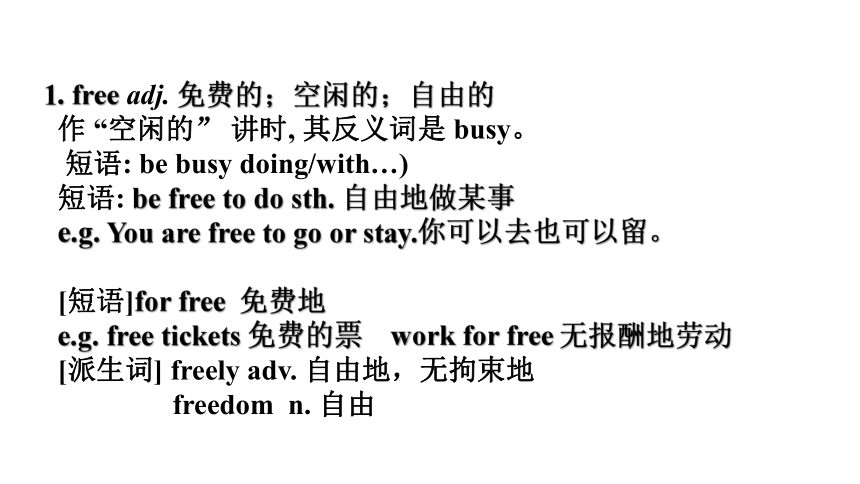
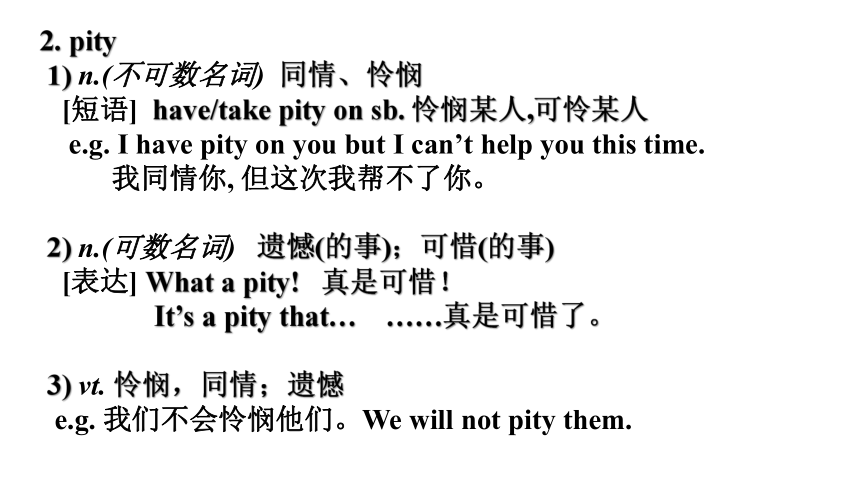
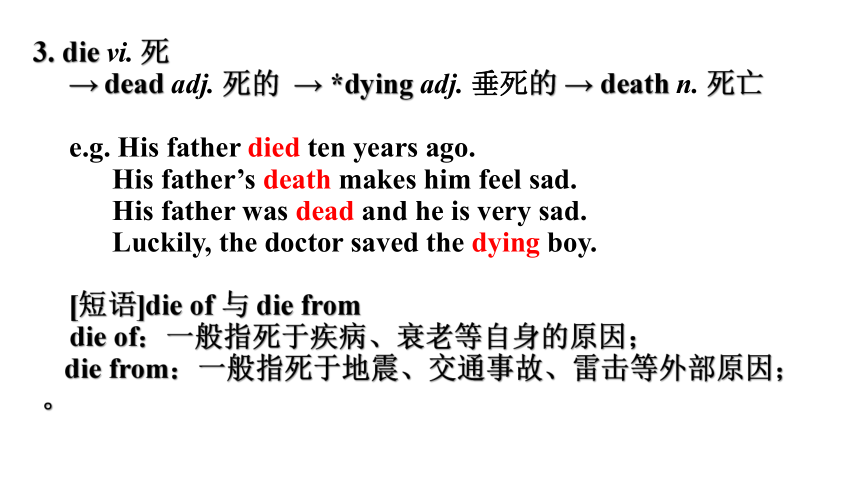
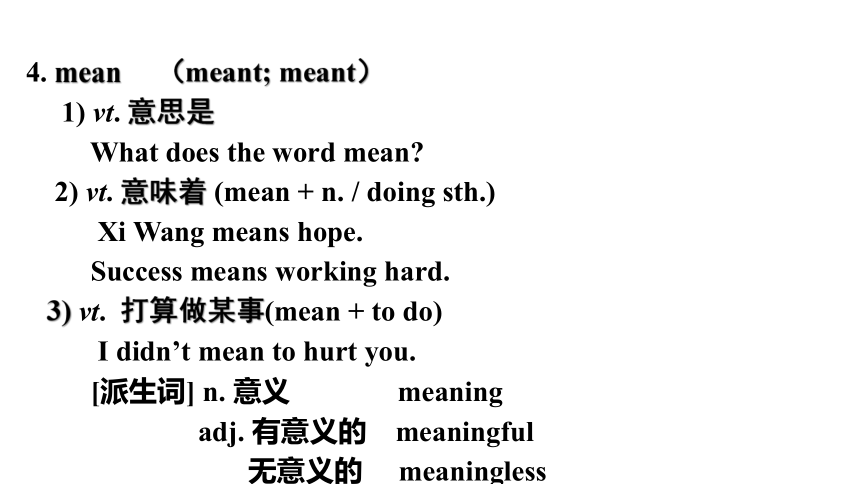
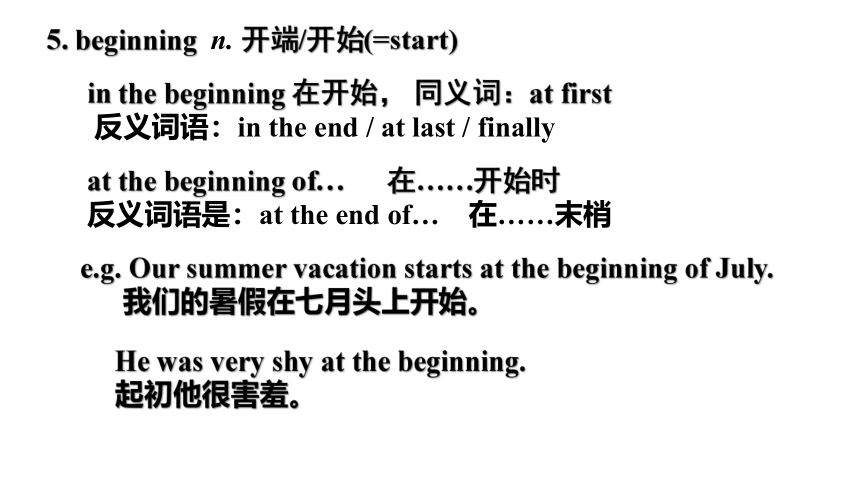
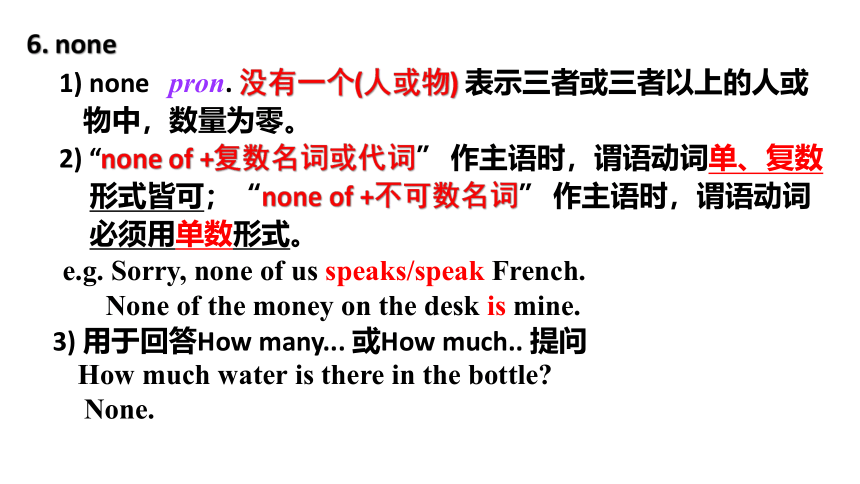
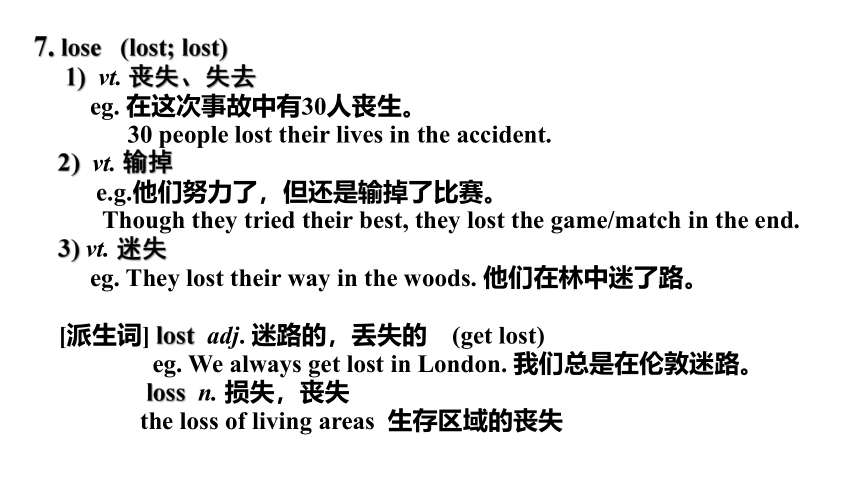

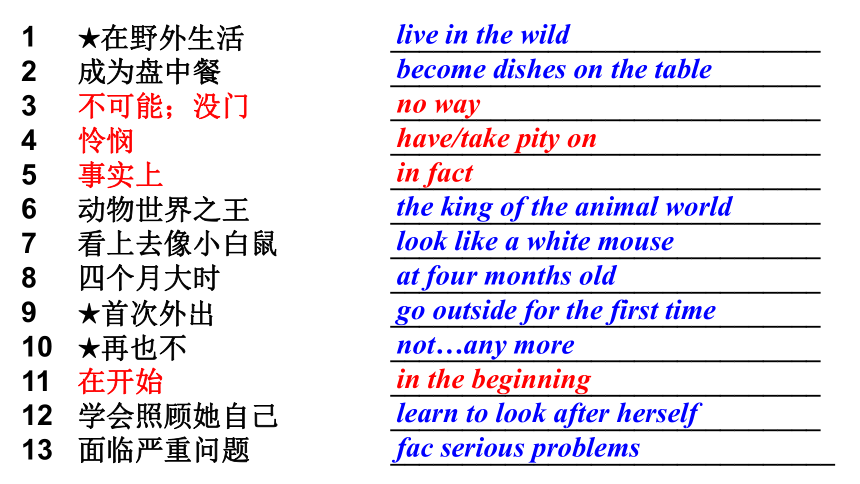
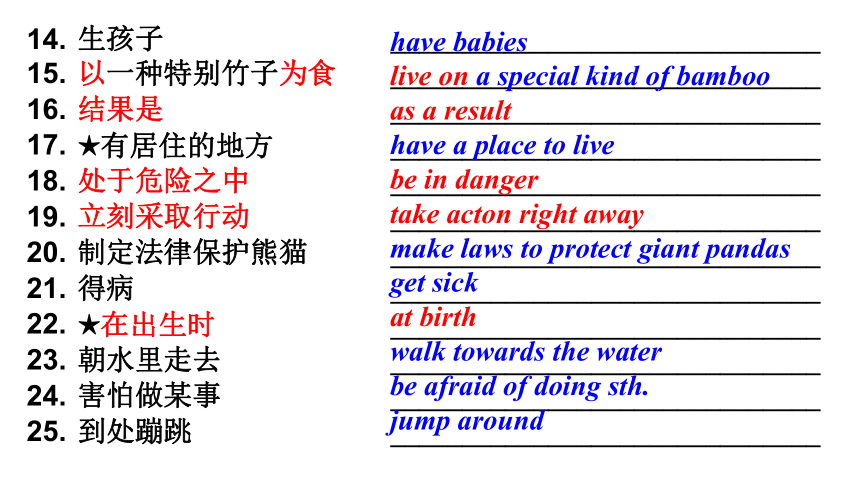
文档简介
(共51张PPT)
Learning aims:
1.能掌握本单元的重点单词、短语及句型。
2.能够运用所学语言点描述大熊猫的成长过程及保护措施。
3.能掌握本单元语法中的情态动词may以及动词不定式的用法,并能正确运用它们。
4. 能根据所给信息写一份报告,并对处于危险中的野生动物发表自己的观点,增强学生保护野生动物的意识。
8A Unit5 Wild animals
Revision
Review the use of some important words
1. free adj. 免费的;空闲的;自由的
作 “空闲的” 讲时, 其反义词是 busy。
短语: be busy doing/with…)
短语: be free to do sth. 自由地做某事
e.g. You are free to go or stay.你可以去也可以留。
[短语]for free 免费地
e.g. free tickets 免费的票 work for free 无报酬地劳动
[派生词] freely adv. 自由地,无拘束地
freedom n. 自由
2. pity
1) n.(不可数名词) 同情、怜悯
[短语] have/take pity on sb. 怜悯某人,可怜某人
e.g. I have pity on you but I can’t help you this time.
我同情你, 但这次我帮不了你。
2) n.(可数名词) 遗憾(的事);可惜(的事)
[表达] What a pity! 真是可惜!
It’s a pity that… ……真是可惜了。
3) vt. 怜悯,同情;遗憾
e.g. 我们不会怜悯他们。We will not pity them.
3. die vi. 死
→ dead adj. 死的 → *dying adj. 垂死的 → death n. 死亡
e.g. His father died ten years ago.
His father’s death makes him feel sad.
His father was dead and he is very sad.
Luckily, the doctor saved the dying boy.
[短语]die of 与 die from
die of:一般指死于疾病、衰老等自身的原因; die from:一般指死于地震、交通事故、雷击等外部原因;
。
4. mean (meant; meant)
1) vt. 意思是
What does the word mean
2) vt. 意味着 (mean + n. / doing sth.)
Xi Wang means hope.
Success means working hard.
3) vt. 打算做某事(mean + to do)
I didn’t mean to hurt you.
[派生词] n. 意义 meaning
adj. 有意义的 meaningful
无意义的 meaningless
in the beginning 在开始, 同义词:at first
反义词语:in the end / at last / finally
at the beginning of… 在……开始时
反义词语是:at the end of… 在……末梢
e.g. Our summer vacation starts at the beginning of July.
我们的暑假在七月头上开始。
He was very shy at the beginning.
起初他很害羞。
5. beginning n. 开端/开始(=start)
6. none
1) none pron. 没有一个(人或物) 表示三者或三者以上的人或物中,数量为零。
2) “none of +复数名词或代词” 作主语时,谓语动词单、复数形式皆可;“none of +不可数名词” 作主语时,谓语动词必须用单数形式。
e.g. Sorry, none of us speaks/speak French.
None of the money on the desk is mine.
3) 用于回答How many... 或How much.. 提问 How much water is there in the bottle
None.
7. lose (lost; lost)
1) vt. 丧失、失去
eg. 在这次事故中有30人丧生。
30 people lost their lives in the accident.
2) vt. 输掉
e.g.他们努力了,但还是输掉了比赛。
Though they tried their best, they lost the game/match in the end.
3) vt. 迷失
eg. They lost their way in the woods. 他们在林中迷了路。
[派生词] lost adj. 迷路的,丢失的 (get lost)
eg. We always get lost in London. 我们总是在伦敦迷路。
loss n. 损失,丧失
the loss of living areas 生存区域的丧失
Review the phrases
1 ★在野外生活 ______________________________
2 成为盘中餐 ______________________________
3 不可能;没门 ______________________________
4 怜悯 ______________________________
5 事实上 ______________________________
6 动物世界之王 ______________________________
7 看上去像小白鼠 ______________________________
8 四个月大时 ______________________________
9 ★首次外出 ______________________________
10 ★再也不 ______________________________
11 在开始 ______________________________
12 学会照顾她自己 ______________________________
13 面临严重问题 _______________________________
live in the wild
become dishes on the table
no way
have/take pity on
in fact
the king of the animal world
look like a white mouse
at four months old
go outside for the first time
not…any more
in the beginning
learn to look after herself
fac serious problems
14. 生孩子 ______________________________
15. 以一种特别竹子为食 ______________________________
16. 结果是 ______________________________
17. ★有居住的地方 ______________________________
18. 处于危险之中 ______________________________
19. 立刻采取行动 ______________________________
20. 制定法律保护熊猫 ______________________________
21. 得病 ______________________________
22. ★在出生时 ______________________________
23. 朝水里走去 ______________________________
24. 害怕做某事 ______________________________
25. 到处蹦跳 ______________________________
have babies
live on a special kind of bamboo
as a result
have a place to live
be in danger
take acton right away
make laws to protect giant pandas
get sick
at birth
walk towards the water
be afraid of doing sth.
jump around
26. 闭眼站着 ______________________________
27. 算出简单数学题 ______________________________
28. ★在…帮助下 ______________________________
29. 迷路 ______________________________
30. ★与...一样的路 ______________________________
31. 节约粮食 ______________________________
32. 短时间地,暂时地 ______________________________
33. 独居 ______________________________
34. 嗅到远处的东西 ______________________________
35. 团队合作 ______________________________
36. 为了取乐而杀死 ______________________________
37. 失去生存地 ______________________________
38. 对人类危险 _______________________________
stand with eyes closed
work out easy math problems
with the help of…
get lost/ lose one’s way
the same way as…
save food
for a short while
live alone
smell things far away
team work
kill … for fun
lose living areas
be dangerous to humans
39. 丧生 ______________________________
41. 出售动物毛皮 ______________________________
42. 真遗憾 ______________________________
43. 行动起来保护野生动物 ______________________________
44. 野生动物俱乐部 ______________________________
45. ★因为捕猎 ______________________________
46. 接受我们的邀请 ______________________________
47. 白天到处转悠 ______________________________
48. 整个冬天睡觉 ______________________________
lose one’s life
sell animals’ fur
what a shame
take action to protect wild animals
Wildlife Club
because of hunting
accept our invitation
walk around in the daytime
sleep through the winter
know different kinds of wild animals
giraffe
horse
lion
camel
squirrel
tiger
zebra
bear
giant panda
monkey
elephant
wolf--wolves
dolphin
know something about XiWang
The growth of Xi Wang
At 1. ________ She 2._______just about 100 grams. She looked like a 3._________ and drank mother’s milk.
At 4 months old The weight of Xi Wang is about 4._____kg. It was her 5.______time to go outside.
At 6 months old She lived 6_______on bamboo.
At 7________ months old She weighed over 35kg. she was not a small baby 8_______9_______.
When she was 20 months old She 10._______to look after herself
birth
weighed
mouse
eight
first
12
any
more
mainly
learnt
How much did Xi Wang weigh………
Xi Wang Weighed ………..
What was the weight of Xi Wang………..
The weight of Xi Wang was ………
5. It was her first time to go outside.
She started to go outside for the first time. (line6)
1 .At birth, she weighed just 100 grams.
At 6 months old, She lived mainly on bamboo.
When she was born (line 3)
at birth = be born 出生时
do sth. for the first time (某人第一次做某事)
It is one’s first time to do sth.
找同义句
一开始,我就知道熊猫主要以竹子为生。
____________, I have known ___________________.
但是,今天是我第一次知道熊猫出生时是喝妈妈的奶。
But, today __________________that pandas drank mother’s milk________
In the beginning
pandas live mainly on bamboo
it’s my first time to know
at birth
For example , it is very difficult for pandas to have babies
As a result, pandas may not have a place to live or food to eat
any more
It is adj (for sb) to do sth
对于某人来说,做某事是…….
easy meaningful important useful impossible interesting …….
as a result 因此
not ------any more= no more 不再
Pandas may no more have a place to live or food to eat.
If we don’t protect the bamboo forests ,
there will not be giant pandas in the world any more.
not……….any more = no more
there will be no more giant pandas in the world.
If we do nothing ,soon there will be none left!
What’s in the fridge
Nothing
How much
How many apples are there in the fridge
None
If we don’t protect the bamboo forests ,
there will not be giant pandas in the world any more.
not……….any more = no more
there will be no more giant pandas in the world.
If we do nothing ,soon there will be none left!
nothing 是泛指“没有任何东西”;
none 是特指某物或者人数量上“没有”。
If we don’t protect bamboo forests ,there may be ______left. ________(因此), pandas will have______ to eat. But some people knew _________about protecting pandas. __________of them wanted to give pandas help.
none
nothing
None
nothing
As a result
Problems Actions
· It is very difficult for pandas to have babies, and many baby pandas die when they are very young.
· Giant pandas live mainly on a special kind of bamboo. However, the bamboo forests are becoming smaller and smaller.
1. help pandas have more babies
2. build more panda reserves
3. make laws to protect pandas
Join clubs and organizations like WWF
Donate money to help protect pandas
Plant more bamboo
Don’t buy things made of animal fur
Don’t throw rubbish in the reserve
………………………
What else can we do to protect the giant pandas
Pandas
weight
food
action
problems
looks
qualities
…
Grammar Re-appearance
情态动词may和动词不定式
The use of “may”
1. may 表示请求或许可
打扰了, 请问我可以坐下来歇会儿吗?
Excuse me. May I sit down and have a rest
may表示请求、许可
--May I ……?
--Yes, you may.
No, you can’t. / you mustn’t.
2. may表示可能性
当我们猜测某件事发生的可能性时,常用may表示______ 、_______ .
也许
可能
e.g. Pandas may not have a place to live.
大熊猫可能没有生存地。
Mr. Zheng may be sleeping in the office.
郑先生可能在办公室里睡觉。
If we do nothing, there may be none left.
假如我们不做任何事,(大熊猫)有可能一个不剩。
过去式为 _____________, ________所表达的可能性比__________大一些。
may
might
might
You may be right.
Maybe/Perhaps you are right.
3. may be 和maybe 的区别
may be 中的may 是情态动词,后面跟be 动词原形,意思是:或许是;也许是
maybe 是副词,不充当句子成分,一般置于句首,同义词:perhaps
Maybe he won’t come to the party.
He may not come to the party.
4. may be -- “也许是”:表示不确定的推测
must be-- “必定是”:表示肯定的推测
can’t be-- “一定不是,不可能是”:表示否定的推测
注意:
mustn’t 表示“禁止”,不可用于推测
1.Be careful to cross the street,otherwise, there
_______be danger.
A.must B.may C.can D.should
2.She______know the secret, but I’m not sure.
A.must B.can C.need D.may
3.He ______be at home because he went to
Australia with his wife yesterday.
A.mustn’t B.can’t C.shouldn’t D.needn’t
may
Can’t
B
D
B
练一练
4.—May I go home now —No, you________.
A.can’t B.mustn’t C.needn’t D.A and B
5.-Must we finish our homework now
--No, you ________.
A.mustn’t B.needn’t C.don’t have to D.B andC
6.May I watch TV now,Mum
Yes, you______, but you_______finish your
homework first.
A.may, may B.may, must C.must, must D.must, may
D
B
D
动词不定式: verbs + ‘to’-infinitives
1. She started to go outside for the first time at 4 months old.
2. She learnt to look after herself when she was 20 months old.
3. When she was six months old, she began to eat bamboo.
4. People have decided to take action to protect pandas.
以上句子中动词不定式to + do. 作动词的宾语。
agree to do sth. 同意做
begin to do sth. 开始做
can’t wait to do迫不及待做
decide to do sth. 决定做
fail to do sth. 做某事失败
forget to do sth. 忘记做
hope to do sth. 希望做
learn to do sth. 学着做
用不定式做宾语的动词(要熟记):
need to do 需要做
plan to do sth. 计划做
prepare to do sth. 准备做
remember to do. 记得做
start to do 开始做
try to do sth. 尝试做
want to do. 想要做
would like to do 想要做
否定形式: not to do sth.
remember __________ sth. 记得要做某事
remember __________ sth. 记得做过某事
区分易混搭配
forget _________ sth. 忘记要做某事
forget _________ sth. 忘记做过某事
to do
doing
to do
doing
e.g. Remembered to close the door. 记得去锁门。
I remember closing the door. 我记得锁上门了。
e.g. I forgot to bring my book. 我忘记带书了。
I forget seeing you somewhere.我忘记在哪里见过你。
try _________ sth. 尽力做某事
try __________ sth. 尝试做某事
区分易混搭配
stop _________ sth. 停下来去做另一件事
stop _________ sth. 停止做某事
to do
doing
to do
doing
I am tired. Let’s stop to have a rest.
Stop talking. Class begins.
He tried to open the door, but failed.
Try doing the opposite and see what happens.
有时,我们还可以在某些动词后使用“疑问词+to do”结构
I don’t know how to do DIY.
You can learn how to play chess.
My sister can’t decide which book to buy.
Suffixes
1.一般动词加ing变成名词。
2.一般形容词加ness变成名词
3.一般以te/t结尾的动词加ion变成名词
小提示:当加上后缀时,有时我们要改变动词的/形容词的词尾。
Change verbs and adjectives
into nouns
sad__________ shop_________
collect_________ invite__________
begin______ kind___________
rich______ protect________
decide________ happy________
discuss_______ sick__________
sadness
shopping
collection
invitation
beginning
kindness
richness
protection
decision
happiness
discussion
sickness
protection
know how to write a report
a report on bears
Looks: big and heavy, large body, short and strong, large paws, short tail
Food: most eat meat and fish, some also eat plants and insects
Abilities: can run very fast, good at climbing and swimming
Qualities: move around slowly in the daytime; sleep through the winter,
seldom hurt people
Danger: hunters catch them for their fur and paws
单元话题作文
Write a report on an animal in danger
Wild animals are our friends.
We should love and protect
them.
Let's make a better world for both people and animals.
Learning aims:
1.能掌握本单元的重点单词、短语及句型。
2.能够运用所学语言点描述大熊猫的成长过程及保护措施。
3.能掌握本单元语法中的情态动词may以及动词不定式的用法,并能正确运用它们。
4. 能根据所给信息写一份报告,并对处于危险中的野生动物发表自己的观点,增强学生保护野生动物的意识。
8A Unit5 Wild animals
Revision
Review the use of some important words
1. free adj. 免费的;空闲的;自由的
作 “空闲的” 讲时, 其反义词是 busy。
短语: be busy doing/with…)
短语: be free to do sth. 自由地做某事
e.g. You are free to go or stay.你可以去也可以留。
[短语]for free 免费地
e.g. free tickets 免费的票 work for free 无报酬地劳动
[派生词] freely adv. 自由地,无拘束地
freedom n. 自由
2. pity
1) n.(不可数名词) 同情、怜悯
[短语] have/take pity on sb. 怜悯某人,可怜某人
e.g. I have pity on you but I can’t help you this time.
我同情你, 但这次我帮不了你。
2) n.(可数名词) 遗憾(的事);可惜(的事)
[表达] What a pity! 真是可惜!
It’s a pity that… ……真是可惜了。
3) vt. 怜悯,同情;遗憾
e.g. 我们不会怜悯他们。We will not pity them.
3. die vi. 死
→ dead adj. 死的 → *dying adj. 垂死的 → death n. 死亡
e.g. His father died ten years ago.
His father’s death makes him feel sad.
His father was dead and he is very sad.
Luckily, the doctor saved the dying boy.
[短语]die of 与 die from
die of:一般指死于疾病、衰老等自身的原因; die from:一般指死于地震、交通事故、雷击等外部原因;
。
4. mean (meant; meant)
1) vt. 意思是
What does the word mean
2) vt. 意味着 (mean + n. / doing sth.)
Xi Wang means hope.
Success means working hard.
3) vt. 打算做某事(mean + to do)
I didn’t mean to hurt you.
[派生词] n. 意义 meaning
adj. 有意义的 meaningful
无意义的 meaningless
in the beginning 在开始, 同义词:at first
反义词语:in the end / at last / finally
at the beginning of… 在……开始时
反义词语是:at the end of… 在……末梢
e.g. Our summer vacation starts at the beginning of July.
我们的暑假在七月头上开始。
He was very shy at the beginning.
起初他很害羞。
5. beginning n. 开端/开始(=start)
6. none
1) none pron. 没有一个(人或物) 表示三者或三者以上的人或物中,数量为零。
2) “none of +复数名词或代词” 作主语时,谓语动词单、复数形式皆可;“none of +不可数名词” 作主语时,谓语动词必须用单数形式。
e.g. Sorry, none of us speaks/speak French.
None of the money on the desk is mine.
3) 用于回答How many... 或How much.. 提问 How much water is there in the bottle
None.
7. lose (lost; lost)
1) vt. 丧失、失去
eg. 在这次事故中有30人丧生。
30 people lost their lives in the accident.
2) vt. 输掉
e.g.他们努力了,但还是输掉了比赛。
Though they tried their best, they lost the game/match in the end.
3) vt. 迷失
eg. They lost their way in the woods. 他们在林中迷了路。
[派生词] lost adj. 迷路的,丢失的 (get lost)
eg. We always get lost in London. 我们总是在伦敦迷路。
loss n. 损失,丧失
the loss of living areas 生存区域的丧失
Review the phrases
1 ★在野外生活 ______________________________
2 成为盘中餐 ______________________________
3 不可能;没门 ______________________________
4 怜悯 ______________________________
5 事实上 ______________________________
6 动物世界之王 ______________________________
7 看上去像小白鼠 ______________________________
8 四个月大时 ______________________________
9 ★首次外出 ______________________________
10 ★再也不 ______________________________
11 在开始 ______________________________
12 学会照顾她自己 ______________________________
13 面临严重问题 _______________________________
live in the wild
become dishes on the table
no way
have/take pity on
in fact
the king of the animal world
look like a white mouse
at four months old
go outside for the first time
not…any more
in the beginning
learn to look after herself
fac serious problems
14. 生孩子 ______________________________
15. 以一种特别竹子为食 ______________________________
16. 结果是 ______________________________
17. ★有居住的地方 ______________________________
18. 处于危险之中 ______________________________
19. 立刻采取行动 ______________________________
20. 制定法律保护熊猫 ______________________________
21. 得病 ______________________________
22. ★在出生时 ______________________________
23. 朝水里走去 ______________________________
24. 害怕做某事 ______________________________
25. 到处蹦跳 ______________________________
have babies
live on a special kind of bamboo
as a result
have a place to live
be in danger
take acton right away
make laws to protect giant pandas
get sick
at birth
walk towards the water
be afraid of doing sth.
jump around
26. 闭眼站着 ______________________________
27. 算出简单数学题 ______________________________
28. ★在…帮助下 ______________________________
29. 迷路 ______________________________
30. ★与...一样的路 ______________________________
31. 节约粮食 ______________________________
32. 短时间地,暂时地 ______________________________
33. 独居 ______________________________
34. 嗅到远处的东西 ______________________________
35. 团队合作 ______________________________
36. 为了取乐而杀死 ______________________________
37. 失去生存地 ______________________________
38. 对人类危险 _______________________________
stand with eyes closed
work out easy math problems
with the help of…
get lost/ lose one’s way
the same way as…
save food
for a short while
live alone
smell things far away
team work
kill … for fun
lose living areas
be dangerous to humans
39. 丧生 ______________________________
41. 出售动物毛皮 ______________________________
42. 真遗憾 ______________________________
43. 行动起来保护野生动物 ______________________________
44. 野生动物俱乐部 ______________________________
45. ★因为捕猎 ______________________________
46. 接受我们的邀请 ______________________________
47. 白天到处转悠 ______________________________
48. 整个冬天睡觉 ______________________________
lose one’s life
sell animals’ fur
what a shame
take action to protect wild animals
Wildlife Club
because of hunting
accept our invitation
walk around in the daytime
sleep through the winter
know different kinds of wild animals
giraffe
horse
lion
camel
squirrel
tiger
zebra
bear
giant panda
monkey
elephant
wolf--wolves
dolphin
know something about XiWang
The growth of Xi Wang
At 1. ________ She 2._______just about 100 grams. She looked like a 3._________ and drank mother’s milk.
At 4 months old The weight of Xi Wang is about 4._____kg. It was her 5.______time to go outside.
At 6 months old She lived 6_______on bamboo.
At 7________ months old She weighed over 35kg. she was not a small baby 8_______9_______.
When she was 20 months old She 10._______to look after herself
birth
weighed
mouse
eight
first
12
any
more
mainly
learnt
How much did Xi Wang weigh………
Xi Wang Weighed ………..
What was the weight of Xi Wang………..
The weight of Xi Wang was ………
5. It was her first time to go outside.
She started to go outside for the first time. (line6)
1 .At birth, she weighed just 100 grams.
At 6 months old, She lived mainly on bamboo.
When she was born (line 3)
at birth = be born 出生时
do sth. for the first time (某人第一次做某事)
It is one’s first time to do sth.
找同义句
一开始,我就知道熊猫主要以竹子为生。
____________, I have known ___________________.
但是,今天是我第一次知道熊猫出生时是喝妈妈的奶。
But, today __________________that pandas drank mother’s milk________
In the beginning
pandas live mainly on bamboo
it’s my first time to know
at birth
For example , it is very difficult for pandas to have babies
As a result, pandas may not have a place to live or food to eat
any more
It is adj (for sb) to do sth
对于某人来说,做某事是…….
easy meaningful important useful impossible interesting …….
as a result 因此
not ------any more= no more 不再
Pandas may no more have a place to live or food to eat.
If we don’t protect the bamboo forests ,
there will not be giant pandas in the world any more.
not……….any more = no more
there will be no more giant pandas in the world.
If we do nothing ,soon there will be none left!
What’s in the fridge
Nothing
How much
How many apples are there in the fridge
None
If we don’t protect the bamboo forests ,
there will not be giant pandas in the world any more.
not……….any more = no more
there will be no more giant pandas in the world.
If we do nothing ,soon there will be none left!
nothing 是泛指“没有任何东西”;
none 是特指某物或者人数量上“没有”。
If we don’t protect bamboo forests ,there may be ______left. ________(因此), pandas will have______ to eat. But some people knew _________about protecting pandas. __________of them wanted to give pandas help.
none
nothing
None
nothing
As a result
Problems Actions
· It is very difficult for pandas to have babies, and many baby pandas die when they are very young.
· Giant pandas live mainly on a special kind of bamboo. However, the bamboo forests are becoming smaller and smaller.
1. help pandas have more babies
2. build more panda reserves
3. make laws to protect pandas
Join clubs and organizations like WWF
Donate money to help protect pandas
Plant more bamboo
Don’t buy things made of animal fur
Don’t throw rubbish in the reserve
………………………
What else can we do to protect the giant pandas
Pandas
weight
food
action
problems
looks
qualities
…
Grammar Re-appearance
情态动词may和动词不定式
The use of “may”
1. may 表示请求或许可
打扰了, 请问我可以坐下来歇会儿吗?
Excuse me. May I sit down and have a rest
may表示请求、许可
--May I ……?
--Yes, you may.
No, you can’t. / you mustn’t.
2. may表示可能性
当我们猜测某件事发生的可能性时,常用may表示______ 、_______ .
也许
可能
e.g. Pandas may not have a place to live.
大熊猫可能没有生存地。
Mr. Zheng may be sleeping in the office.
郑先生可能在办公室里睡觉。
If we do nothing, there may be none left.
假如我们不做任何事,(大熊猫)有可能一个不剩。
过去式为 _____________, ________所表达的可能性比__________大一些。
may
might
might
You may be right.
Maybe/Perhaps you are right.
3. may be 和maybe 的区别
may be 中的may 是情态动词,后面跟be 动词原形,意思是:或许是;也许是
maybe 是副词,不充当句子成分,一般置于句首,同义词:perhaps
Maybe he won’t come to the party.
He may not come to the party.
4. may be -- “也许是”:表示不确定的推测
must be-- “必定是”:表示肯定的推测
can’t be-- “一定不是,不可能是”:表示否定的推测
注意:
mustn’t 表示“禁止”,不可用于推测
1.Be careful to cross the street,otherwise, there
_______be danger.
A.must B.may C.can D.should
2.She______know the secret, but I’m not sure.
A.must B.can C.need D.may
3.He ______be at home because he went to
Australia with his wife yesterday.
A.mustn’t B.can’t C.shouldn’t D.needn’t
may
Can’t
B
D
B
练一练
4.—May I go home now —No, you________.
A.can’t B.mustn’t C.needn’t D.A and B
5.-Must we finish our homework now
--No, you ________.
A.mustn’t B.needn’t C.don’t have to D.B andC
6.May I watch TV now,Mum
Yes, you______, but you_______finish your
homework first.
A.may, may B.may, must C.must, must D.must, may
D
B
D
动词不定式: verbs + ‘to’-infinitives
1. She started to go outside for the first time at 4 months old.
2. She learnt to look after herself when she was 20 months old.
3. When she was six months old, she began to eat bamboo.
4. People have decided to take action to protect pandas.
以上句子中动词不定式to + do. 作动词的宾语。
agree to do sth. 同意做
begin to do sth. 开始做
can’t wait to do迫不及待做
decide to do sth. 决定做
fail to do sth. 做某事失败
forget to do sth. 忘记做
hope to do sth. 希望做
learn to do sth. 学着做
用不定式做宾语的动词(要熟记):
need to do 需要做
plan to do sth. 计划做
prepare to do sth. 准备做
remember to do. 记得做
start to do 开始做
try to do sth. 尝试做
want to do. 想要做
would like to do 想要做
否定形式: not to do sth.
remember __________ sth. 记得要做某事
remember __________ sth. 记得做过某事
区分易混搭配
forget _________ sth. 忘记要做某事
forget _________ sth. 忘记做过某事
to do
doing
to do
doing
e.g. Remembered to close the door. 记得去锁门。
I remember closing the door. 我记得锁上门了。
e.g. I forgot to bring my book. 我忘记带书了。
I forget seeing you somewhere.我忘记在哪里见过你。
try _________ sth. 尽力做某事
try __________ sth. 尝试做某事
区分易混搭配
stop _________ sth. 停下来去做另一件事
stop _________ sth. 停止做某事
to do
doing
to do
doing
I am tired. Let’s stop to have a rest.
Stop talking. Class begins.
He tried to open the door, but failed.
Try doing the opposite and see what happens.
有时,我们还可以在某些动词后使用“疑问词+to do”结构
I don’t know how to do DIY.
You can learn how to play chess.
My sister can’t decide which book to buy.
Suffixes
1.一般动词加ing变成名词。
2.一般形容词加ness变成名词
3.一般以te/t结尾的动词加ion变成名词
小提示:当加上后缀时,有时我们要改变动词的/形容词的词尾。
Change verbs and adjectives
into nouns
sad__________ shop_________
collect_________ invite__________
begin______ kind___________
rich______ protect________
decide________ happy________
discuss_______ sick__________
sadness
shopping
collection
invitation
beginning
kindness
richness
protection
decision
happiness
discussion
sickness
protection
know how to write a report
a report on bears
Looks: big and heavy, large body, short and strong, large paws, short tail
Food: most eat meat and fish, some also eat plants and insects
Abilities: can run very fast, good at climbing and swimming
Qualities: move around slowly in the daytime; sleep through the winter,
seldom hurt people
Danger: hunters catch them for their fur and paws
单元话题作文
Write a report on an animal in danger
Wild animals are our friends.
We should love and protect
them.
Let's make a better world for both people and animals.
